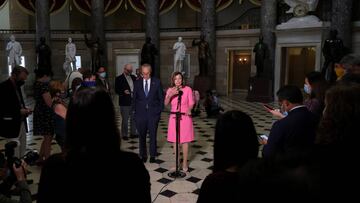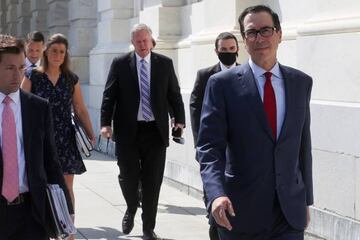Second stimulus check: how will negotiations continue?
White House officials and Democratic leaders could not reach an agreement on a new coronavirus relief deal on Friday, so what happens now?

White House officials and Democratic leaders hammered out the details and logistics of presenting a of a new, multi-trillion dollar coronavirus relief package on Friday but after a three-hour meeting they were no closer to reaching an agreement. Negotiations remain gridlocked with several key issues unresolved and both sides seemingly nowhere nearer finding any common ground. The major two areas which could not be agreed on concerned the $600 weekly supplement to unemployment benefits which ended last month and how much money would be channelled to individual states. “The president would like us to make a deal, but unfortunately, we did not make any progress. We discussed the same issues," Treasury Secretary Steven Mnuchin explained after the meeting. So, with talks expected to resume next week, what happens now?
New stimulus package could be passed by Tuesday or Wednesday
If talks resume on Monday and an agreement on a new aid deal is reached, then in theory, legislation could go to a vote as early as Tuesday or Wednesday and be ready for the President to sign off by Thursday. That however, would be the earliest a deal could go through and depends on things running smoother than they have for the past fortnight.
There is also the possibility that Donald Trump could sign an executive order without Congress' approval by the end of the week. The order would tackle four main issues - deferring payroll tax until the end of the year; extending enhanced unemployment benefits until the end of the year; deferring student-loan payments and forgiving interest on student loans “until further notice”; and extending a moratorium on evictions. There have been some concerns about the legality of such a move but Trump seemed unperturbed about being sued when he gave his press briefing yesterday.

Chance that no deal is reached
The other possible outcome is that talks collapse completely and no deal is reached. That would be the worst case scenario and one which both sides will be keen to avoid. Other potential setbacks could arise if the Senate sends the bill back to the House for amendments. That would further delay the new aid package. Once the Senate passes the bill, Trump will have a maximum of 10 days to sign it off although as we saw with the CARES Act at the end of March, the president likes to get things out of the way rather than let them fester for longer than necessary.
See also:
Trump executive orders: is a second stimulus check coming?
Second stimulus check: How much money could you get?
Second stimulus check eligibility requirements: what to expect
- USA coronavirus stimulus checks
- Coronavirus stimulus checks
- Covid-19 economic crisis
- Donald Trump
- United States Senate
- Science
- Unemployment
- Coronavirus Covid-19
- Economic crisis
- United States Congress
- Pandemic
- Coronavirus
- Recession
- United States
- Economic climate
- Virology
- Outbreak
- Infectious diseases
- Employment
- North America
- Parliament
- Microbiology
- Diseases
- Medicine
- America
- Economy
- Work
- Biology
- Health
- Politics
- Life sciences





